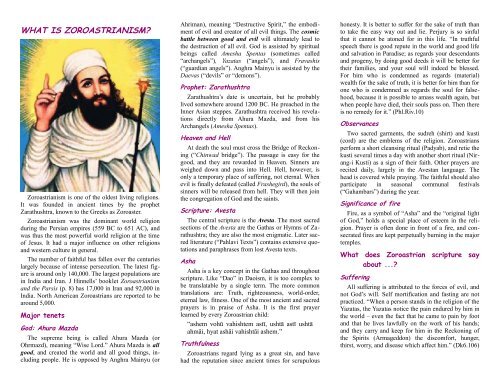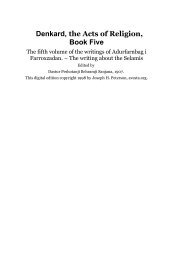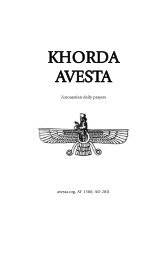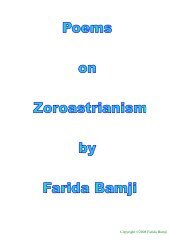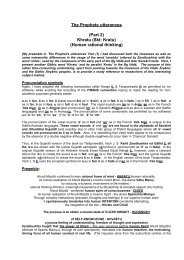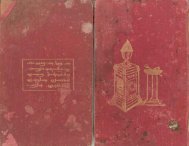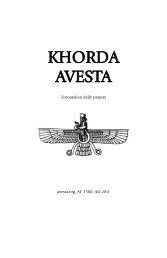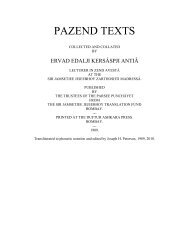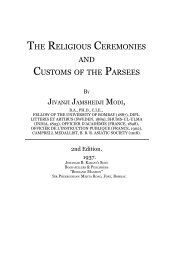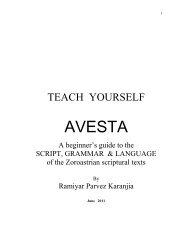WHAT IS ZOROASTRIANISM? - Avesta
WHAT IS ZOROASTRIANISM? - Avesta
WHAT IS ZOROASTRIANISM? - Avesta
Create successful ePaper yourself
Turn your PDF publications into a flip-book with our unique Google optimized e-Paper software.
<strong>WHAT</strong> <strong>IS</strong> ZOROASTRIAN<strong>IS</strong>M?<br />
Zoroastrianism is one of the oldest living religions.<br />
It was founded in ancient times by the prophet<br />
Zarathushtra, known to the Greeks as Zoroaster.<br />
Zoroastrianism was the dominant world religion<br />
during the Persian empires (559 BC to 651 AC), and<br />
was thus the most powerful world religion at the time<br />
of Jesus. It had a major influence on other religions<br />
and western culture in general.<br />
The number of faithful has fallen over the centuries<br />
largely because of intense persecution. The latest figure<br />
is around only 140,000. The largest populations are<br />
in India and Iran. J Hinnells’ booklet Zoroastrianism<br />
and the Parsis (p. 8) has 17,000 in Iran and 92,000 in<br />
India. North American Zoroastrians are reported to be<br />
around 5,000.<br />
Major tenets<br />
God: Ahura Mazda<br />
The supreme being is called Ahura Mazda (or<br />
Ohrmazd), meaning “Wise Lord.” Ahura Mazda is all<br />
good, and created the world and all good things, including<br />
people. He is opposed by Anghra Mainyu (or<br />
Ahriman), meaning “Destructive Spirit,” the embodiment<br />
of evil and creator of all evil things. The cosmic<br />
battle between good and evil will ultimately lead to<br />
the destruction of all evil. God is assisted by spiritual<br />
beings called Amesha Spentas (sometimes called<br />
“archangels”), Yazatas (“angels”), and Fravashis<br />
(“guardian angels”). Anghra Mainyu is assisted by the<br />
Daevas (“devils” or “demons”).<br />
Prophet: Zarathushtra<br />
Zarathushtra’s date is uncertain, but he probably<br />
lived somewhere around 1200 BC. He preached in the<br />
Inner Asian steppes. Zarathushtra received his revelations<br />
directly from Ahura Mazda, and from his<br />
Archangels (Amesha Spentas).<br />
Heaven and Hell<br />
At death the soul must cross the Bridge of Reckoning<br />
(“Chinwad bridge”). The passage is easy for the<br />
good, and they are rewarded in Heaven. Sinners are<br />
weighed down and pass into Hell. Hell, however, is<br />
only a temporary place of suffering, not eternal. When<br />
evil is finally defeated (called Frashegird), the souls of<br />
sinners will be released from hell. They will then join<br />
the congregation of God and the saints.<br />
Scripture: <strong>Avesta</strong><br />
The central scripture is the <strong>Avesta</strong>. The most sacred<br />
sections of the <strong>Avesta</strong> are the Gathas or Hymns of Zarathushtra;<br />
they are also the most enigmatic. Later sacred<br />
literature (“Pahlavi Texts”) contains extensive quotations<br />
and paraphrases from lost <strong>Avesta</strong> texts.<br />
Asha<br />
Asha is a key concept in the Gathas and throughout<br />
scripture. Like “Dao” in Daoism, it is too complex to<br />
be translatable by a single term. The more common<br />
translations are: Truth, righteousness, world-order,<br />
eternal law, fitness. One of the most ancient and sacred<br />
prayers is in praise of Asha. It is the first prayer<br />
learned by every Zoroastrian child:<br />
“ashem vohū vahishtem astī, ushtā astī ushtā<br />
ahmāi, hyat ashāi vahishtāi ashem.”<br />
Truthfulness<br />
Zoroastrians regard lying as a great sin, and have<br />
had the reputation since ancient times for scrupulous<br />
honesty. It is better to suffer for the sake of truth than<br />
to take the easy way out and lie. Perjury is so sinful<br />
that it cannot be atoned for in this life. “In truthful<br />
speech there is good repute in the world and good life<br />
and salvation in Paradise; as regards your descendants<br />
and progeny, by doing good deeds it will be better for<br />
their families, and your soul will indeed be blessed.<br />
For him who is condemned as regards (material)<br />
wealth for the sake of truth, it is better for him than for<br />
one who is condemned as regards the soul for falsehood,<br />
because it is possible to amass wealth again, but<br />
when people have died, their souls pass on. Then there<br />
is no remedy for it.” (Phl.Riv.10)<br />
Observances<br />
Two sacred garments, the sudreh (shirt) and kusti<br />
(cord) are the emblems of the religion. Zoroastrians<br />
perform a short cleansing ritual (Padyab), and retie the<br />
kusti several times a day with another short ritual (Nirang-i<br />
Kusti) as a sign of their faith. Other prayers are<br />
recited daily, largely in the <strong>Avesta</strong>n language. The<br />
head is covered while praying. The faithful should also<br />
participate in seasonal communal festivals<br />
(“Gahambars”) during the year.<br />
Significance of fire<br />
Fire, as a symbol of “Asha” and the “original light<br />
of God,” holds a special place of esteem in the religion.<br />
Prayer is often done in front of a fire, and consecrated<br />
fires are kept perpetually burning in the major<br />
temples.<br />
What does Zoroastrian scripture say<br />
about ...?<br />
Suffering<br />
All suffering is attributed to the forces of evil, and<br />
not God’s will. Self mortification and fasting are not<br />
practiced. “When a person stands in the religion of the<br />
Yazatas, the Yazatas notice the pain endured by him in<br />
the world – even the fact that he came to pain by foot<br />
and that he lives lawfully on the work of his hands;<br />
and they carry and keep for him in the Reckoning of<br />
the Spirits (Armageddon) the discomfort, hunger,<br />
thirst, worry, and disease which affect him.” (Dk6.106)
Paying attention<br />
“As the soul is thus not all, but is in the world for a<br />
period for maintaining the body, it is necessary to walk<br />
with such circumspection as if one were without<br />
shoes, and the whole of this world were full of snakes,<br />
scorpions, noxious reptiles, and thorns, and one’s fear<br />
were: ‘Let not the reptiles bite me, or the thorns penetrate<br />
me.’” (Dk6.b47)<br />
Education<br />
“It is the desire of Ahura Mazda from people is this:<br />
‘Know me’, for he knows: ‘If they know me, everyone<br />
will follow me’. The desire of Angra Mainyu is this:<br />
‘Do not know me’, for he knows: ‘If they know me no<br />
one will follow me’.” (Dk6.31)<br />
Joy<br />
Angra Mainyu is best fought by joy; despondency is<br />
a symptom of his victory.<br />
Hope<br />
“There is a remedy for everything but death, a hope<br />
for everything but wickedness, and everything will<br />
lapse except righteousness.” (SLS.20.17)<br />
Charity<br />
Charity is essential, but shouldn’t be given blindly:<br />
“This also is revealed in the religion, that Ohrmazd<br />
said to Zartosht, ‘He who performs charity knowingly<br />
and discriminately is like me, I who am Ohrmazd. And<br />
he who performs charity ignorantly and without understanding<br />
and indiscriminately is like Ahriman’. ...<br />
‘Charity is something so worthy, there are 33 ways<br />
from Garothman [Paradise] to the Chinwad Bridge,<br />
and everyone who is blessed on account of meritorious<br />
action is then able to go on one way, and he who is<br />
blessed on account of charity is able to go on all those<br />
ways’. ... ‘Whatever charitable men give, I give them<br />
twofold in return, and I store it up’.” (Phl.Riv.10)<br />
Responsibility<br />
Zarathushtra said “May we be the ones to make this<br />
world a better place!” (Y30.9) “When Ahura Mazda<br />
the Lord first created humanity, He gave the following<br />
order: ‘Be diligent to save your souls; I shall then<br />
provide for your bodily matters. For it is impossible to<br />
save your souls without you.’ People are deluded in<br />
the following manner: they themselves strive after<br />
material things, and as regards the things of the soul,<br />
they put their trust in the Yazatas.” (Dk6.291)<br />
Abortion<br />
A child is said to be formed, and a soul added to its<br />
body, after a woman has been pregnant for four<br />
months and ten days. Abortion was considered murder<br />
after that period. (Vd15.9-16)<br />
The Zoroastrian Creed<br />
The creed is often summed up as “good thoughts,<br />
good words, good deeds.” It is given in full in Yasna<br />
12 and echoes its ancient origins. It is likely to have<br />
been composed by Zarathushtra himself, and to have<br />
been used as an avowal of faith by early converts (Cf.<br />
Boyce, Zoroastrianism, Its Antiquity and Constant<br />
Vigour, p. 102-4). It reads in part:<br />
“I ascribe all good to Ahura Mazda, and all the best,<br />
Asha-endowed, splendid, splendor-endowed, whose is<br />
the cow, whose is Asha, whose is the light, ‘may<br />
whose blissful areas be filled with light.’ ... Even as<br />
Zarathushtra rejected the authority of the Daevas, so I<br />
also reject, as Mazda-worshipper and supporter of Zarathushtra,<br />
the authority of the Daevas, even as he, the<br />
Asha-endowed Zarathushtra, has rejected them. As the<br />
belief of the waters, the belief of the plants, the belief<br />
of the well-made (Original) Cow; as the belief of<br />
Ahura Mazda who created the cow and the Asha-endowed<br />
Man; as the belief of Zarathushtra, the belief of<br />
Kavi Vishtaspa, the belief of both Frashaostra and<br />
Jamaspa; as the belief of each of the Saoshyants (Saviors)<br />
– fulfilling destiny and Asha-endowed – so I am<br />
a Mazda-worshipper of this belief and teaching. I profess<br />
myself a Mazda-worshipper, a Zoroastrian, having<br />
vowed it and professed it. I pledge myself to the wellthought<br />
thought, I pledge myself to the well-spoken<br />
word, I pledge myself to the well-done action. I pledge<br />
myself to the Mazdayasnian religion, which causes the<br />
attack to be put off and weapons put down; Asha-endowed;<br />
which of all religions that exist or shall be, is<br />
the greatest, the best, and the most beautiful: Ahuric,<br />
Zoroastrian. I ascribe all good to Ahura Mazda. This is<br />
the creed of the Mazdayasnian religion.”<br />
(“Good thoughts, good words, good deeds”)<br />
The Hymns (“Gathas”) of Zarathushtra<br />
To quote Dr. Boyce again, “The prophet Zarathushtra,<br />
son of Pourushaspa, of the Spitaman<br />
family, is known to us primarily from the Gathas,<br />
seventeen great hymns which he composed and which<br />
have been faithfully preserved by his community.<br />
These are not works of instruction, but inspired,<br />
passionate utterances, many of them addressed directly<br />
to God; and their poetic form is a very ancient one,<br />
which has been traced back (through Norse parallels)<br />
to Indo-European times. It seems to have been linked<br />
with a mantic tradition, that is, to have been cultivated<br />
by priestly seers who sought to express in lofty words<br />
their personal apprehension of the divine; and it is<br />
marked by subtleties of allusion, and great richness<br />
and complexity of style. Such poetry can only have<br />
been fully understood by the learned; and since<br />
Zoroaster believed that he had been entrusted by God<br />
with a message for all mankind, he must also have<br />
preached again and again in plain words to ordinary<br />
people. His teachings were handed down orally in his<br />
community from generation to generation, and were at<br />
last committed to writing under the Sasanians, rulers<br />
of the third Iranian empire. The language then spoken<br />
was Middle Persian, also called Pahlavi; and the<br />
Pahlavi books provide invaluable keys for interpreting<br />
the magnificent obscurities of the Gathas themselves.”<br />
- Zoroastrians, Their religious beliefs and practices,<br />
London, 1979, p. 17.<br />
Symbol commonly used to represent the Farohar (or<br />
Guardian Angel)<br />
© 1996 JHP, avesta.org


